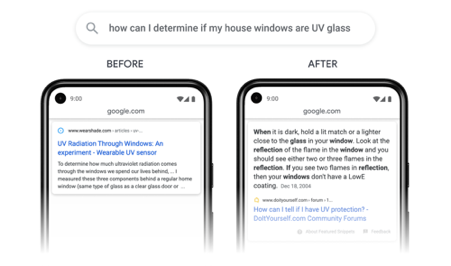Search on livestream update - is Google indexing passages of content?
During a recent live stream, Search On 2020, Google shared how it is using AI to help advance its products.
Their latest research into AI has enabled them to make advancements to search ranking. One of these advancements relates to their understanding of passages of text within a web page.
Before, they used to focus on the overall relevancy of a web page to a particular topic. Now they can take the relevance of a single passage of content into consideration.
What does this mean?
Essentially, Google is trying to improve the results for queries searching for a precise answer. The example they gave was - ‘how can I determine if my house windows are UV glass.’
During the live stream, Google said “This is a pretty tricky query, and we get lots of webpages that talk about UV glass and how you need a special film, but none of this helps the layperson take action. Our new algorithm can zoom right into this one passage on a DIY forum that answers the question.”

The change means rather than surfacing a page that relates to UV glass but doesn’t help answer the question, Google’s systems will surface a passage of content on a page that may not be related to the topic, but directly answers the query.
Google says that this update should affect around 7% of all queries once the global roll-out occurs.
It is important to note that Google is not changing the way it indexes content and web pages. This update relates explicitly to the ranking of content. Relevant passages become an additional ranking factor alongside the web page.
Isn’t this similar to a featured snippet?
No, Google has said “systems determine the relevance of any web document via an understanding of passages. Featured snippets, on the other hand, identifies the most relevant passage in a document we’ve overall determined to be relevant to the query.”
However, there remains some confusion, and we may not see resolution until after this change rolls out globally.
The example Google provided (see image above) clearly shows the addition of a featured snippet to the search result in its ‘after’ view, and this may be leading to false assumptions that the two are more closely related than they are.
What does this mean for your SEO efforts?
In the grand scheme of things, this shouldn’t change the way you write content. You still need to produce great content which focuses on users and answering their needs.
What this may change is how marketers think about content for SEO in a strategic sense.
If this change brings a significant improvement to search results, this will be a good thing for users. Indeed, these are keywords with which search engines do tend to struggle – search results often rank pages which provide the opposite answer, or information that is far too generic to be useful.
If Google has found a way to overcome this problem, it may make long-form content even more valuable by increasing the spread of keywords that can rank. It’s undoubtedly the long-tail keywords – those with low volume – which will see the most impact.
For example, a page of content may be better able to rank for keywords reflecting opposite needs. An article about the ‘best value running shoes’ might be better able to rank for keywords relating to choosing the right type of shoe.
Our thinking is speculative at this point, but we need to be prepared to test, observe and adapt our approach depending on what we see.
Keep learning with Fresh Egg
Join our email list like thousands of other marketing professionals to get updates on key industry changes, early access to free resources and exclusive invitations to Fresh Egg events in your inbox.